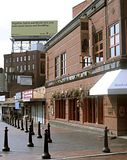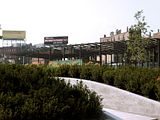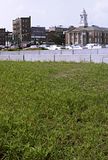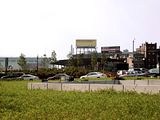Governor vetoes $31m for Greenway
By Michael Levenson, Globe Staff | July 30, 2006
Governor Mitt Romney has vetoed $31 million for the Rose Kennedy Greenway, the 27-acre ribbon of parks and development being built in downtown Boston, saying it is much more important to use the money to repair the Big Dig tunnels underground.
The move has surprised and angered supporters of the Greenway, who said the veto could delay construction of two highly anticipated cultural institutions -- The Boston Museum, a history center near Quincy Market; and the New
Center for Arts and Culture, a forum for music, theater, and dance near The Boston Harbor Hotel. And tentative plans for a YMCA community center near the TD Banknorth Garden might have to be scrapped altogether, said John M. Ferrell, president and chief executive of the YMCA of Greater Boston.
Supporters fear that Romney is losing sight of the grand vision of renewal for Boston that Big Dig planners promised, epitomized by the replacement of the hulking Central Artery with an inviting green space and a walkway from the North End to downtown.
``You've got to take the long view, and the long view is the tunnel is going to be repaired, public confidence is going to be restored, and we have to create the Greenway that has been envisioned all along," said Ronald M. Druker , chairman of the New Center.
big dig: Problems Coverage Traffic Updates
The Legislature had approved the money to build covers over the ramps that connect Interstate 93 to streets near the North End, Faneuil Hall, and Rowes Wharf, where each of the proposed buildings is planned.
But Romney -- having seized control of Big Dig inspections from the Massachusetts Turnpike Authority and forced out its chairman, Matthew J. Amorello -- said the state must reserve the money for fixes to the project's highways and tunnels.
The state has been conducting what Romney calls a ``stem-to-stern" audit of the highway system since the July 10 death of Milena Del Valle.
A Jamaica Plain mother of three, Del Valle was killed in the Interstate 90 connector when concrete fell from the ceiling onto her car.
``We may need these funds for repairing these tunnels, and repairing the tunnels is our first priority," said Eric Fehrnstrom, Romney's spokesman.
State officials have said they do not know how much the repairs will cost.
Romney also argued that spending $31 million on Greenway ramps placed an unfair burden on the millions of taxpayers who live outside Boston.
``Massachusetts taxpayers throughout the state should not be forced to pay for the build-out and development of parcels that will benefit predominantly residents of the city of Boston and select organizations that are capable of accessing private funds," Romney wrote in a letter to the Legislature accompanying his veto Friday. ``It is more appropriate to rely on the private sector and the City of Boston for additional costs."
Romney vetoed the $31 million as part of $56 million that he cut from an approximately $189 million spending bill passed by the Legislature.
Greenway supporters said they would push legislators to override the veto tomorrow, the last day of formal sessions.
``It's not realistic to expect nonprofit organizations to pay for those ramps, and if you look at the record, it's always been up to the government to do that," Ferrell said. ``And I'm surprised that the governor doesn't see it that way because the legislative leaders in the House and Senate and the Boston Redevelopment Authority have been very supportive of this, and the governor is the only public official I know who is not."
Spokesmen for House Speaker Salvatore F. DiMasi and Senate President Robert E. Travaglini, both Boston Democrats, did not return calls for comment.
The veto surprised city leaders because the state agreed to pay for the ramps in the early 1990s when it certified the Big Dig's environmental credentials, said Richard A. Dimino, president and chief executive of A Better City, a coalition of downtown business leaders formerly known as the Artery Business Committee.
big dig: Problems Coverage Traffic Updates
Mayor Thomas M. Menino said the city never expected to pay for the roads and ramps leading to the Greenway.
``The governor doesn't understand the fact that . . . the Rose Kennedy Greenway is a state project; the city doesn't have any piece of that, so either he's misinformed or someone wrote him a letter saying it was the city's responsibility," Menino said. ``I'm a little perplexed by his quotes in the letter [to the Legislature] because it doesn't fit the political rhetoric we've heard for a long time on state and city relations when it comes to the Rose Kennedy Greenway."
Amorello considers the veto ``an unfortunate move," his spokeswoman, Mariellen Burns, said.
``Chairman Amorello thought it was very important to assist in covering the ramps," Burns said. ``This is the state fulfilling its responsibility per the environmental permitting for the project."
Peter G. Meade, chairman of the Greenway Conservancy, the 10-member board that raises money for the area's parks and cultural activities, disputed Romney's contention that private interests could pay for Greenway ramps.
``Building the highway, including the ramps, is absolutely, clearly, and totally the government's responsibility," he said.
Michael Levenson can be reached at
mlevenson@globe.com.
? Copyright 2006 Globe Newspaper Company.





